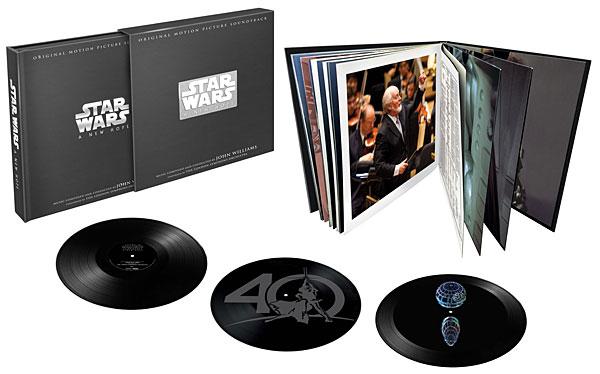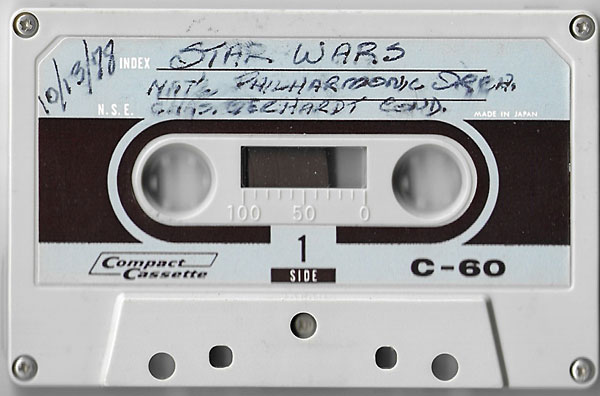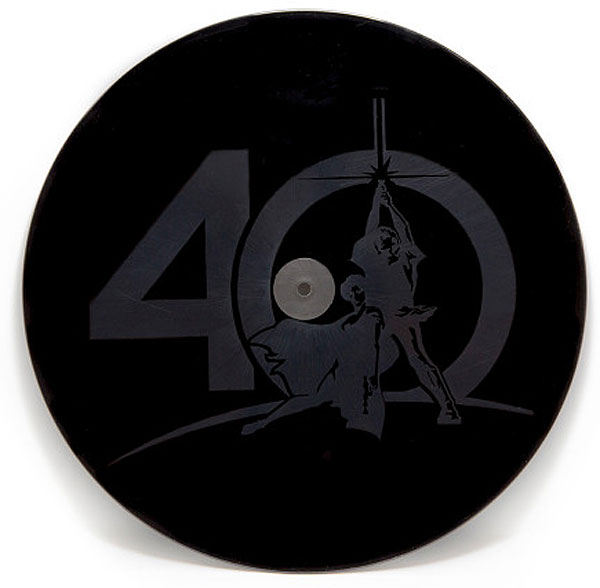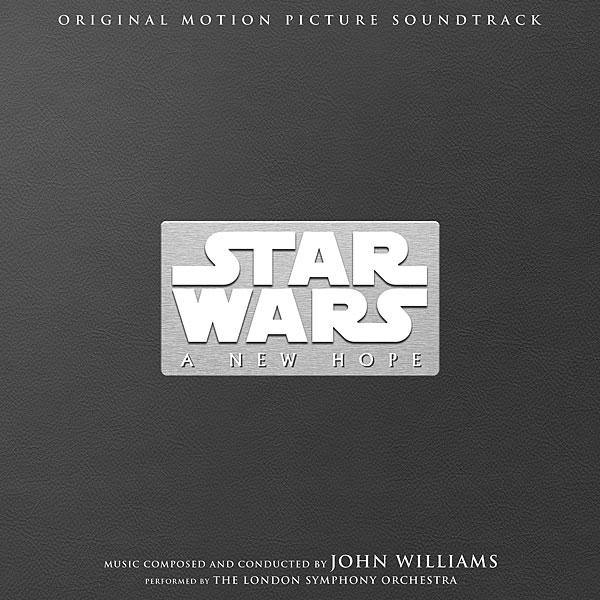I am also from Mt. Lebanon - it's always a thrill to see your hometown mentioned.
Star Wars: A New Hope - 40th Anniversary 3LP Collector's Edition


And though my grandfather passed away in the early 1980s, right on the cusp of the CD revolution, he would surely have approved of today's review subject—namely, Walt Disney Records' Star Wars: A New Hope – 40th Anniversary 3LP Collector's Edition box set. Of late, Disney's record division has doubled down and renewed their efforts to press high-grade vinyl for a number of key catalog soundtrack entries for both live-action and animated films, noteworthy picture discs, and other high-profile Disney-owned franchises. (In fact, it's likely a good number of you already own their February 2019 2LP 180-gram gatefold release of the well-lauded Bohemian Rhapsody soundtrack, just as I do.)
Among the clear-cut gems residing in Disney's current catalog offerings is the aforementioned Star Wars: A New Hope box set, initially released on three 180-gram LPs in November 2017 to tie in with the 40th anniversary of the storied George Lucas franchise. Truly the crown jewel in the Disney LP canon, the New Hope soundtrack has been given the properly lavish treatment it so rightly deserves. As many of you know, I'm a stickler for packaging when it comes to box set presentation, and Disney has gone all out in all the right ways here. The sturdy textured black slipcase, replete with the signature curvy Star Wars logo emblazoned in shiny rectangular form and centered perfectly on the front, has yet to show signs of overt smudging or fingerprint residue. I also very much like the inclusion of the three-sided, ½-inch-wide slatted cardboard liner that folds into the gaps around the trio of open sides on the inner black hardcover book for further protection.

The 52-page book—which also houses each LP in snug, but not TOO snug, individual inner sleeves—slides out from the open left side of the outer box instead of the traditional right and is rife with historical information. A pair of detailed essays—Jeff Bond's "Tuning Up a Galaxy" and Jeff Eldridge's "John Williams' Journey to Star Wars"—give full breadth to the overall significance of the original motion picture soundtrack itself and the continuing impact the 88-years-young Williams has on film scoring to this very day. "The score is in a 19th century language, and many young people have not heard that sort of music or a symphony orchestra before," Eldridge quotes Williams saying to fellow legendary conductor André Previn in 1977, and little else could better describe the Star Wars/ score listening experience for a then-young listener like myself, as this soundtrack LITERALLY opened my ears to a world of music I only had a passing knowledge of at best at that point in my pre-teen life. (After hearing the Gerhardt-conducted versions I mentioned at the outset of this review, I soon enough sought out the original Williams soundtrack on vinyl, and eventually bought the ensuing remastered CD releases as well—of course.)
The addition of many rarely seen recording session photos, artist renderings and character sketches, and various archetypical film stills all add to the excellence factor of the packaging. The inclusion of the original soundtrack release's liner notes is another nice touch, as the ever-venerable Charles Lippincott's track-by-track box score-like liner notes are beyond invaluable to consult in real time while listening to the music itself. That said, the grammar police must take the original release's proofreaders to task for the misuse of the possessive in a subhead referring to "John William's [sic] Approach"—something that's most decidedly NOT beyond reproach, imo, regardless of whether it's technically a British nomenclature kind of thing or otherwise, especially given how it appears properly throughout the balance of the other included essays' text. (That said, let's all hold our lightsabers at half-mast in a moment of silence for Lippincott, who recently passed away at age 80 on May 19.)
The music itself—composed and conducted by Williams, performed by The London Symphony Orchestra, and recorded over March 5-16, 1977 at Anvil Recording Studios in Denham, England—is, to put it bluntly, EXTRAORDINARILY out of this world. The choice to remaster this soundtrack for 24-bit/192kHz presentation on 180-gram wax only serves to open the breadth and depth of Williams' artful compositions. The iconic, heroic uplift of "Main Title" naturally opens Side 1, and it instantly transported me back to the first time I saw the film in the movie theater in June 1977 in the process. (And, yes, I had my personal copy of the Star Wars Del Ray paperback in hand in said theater at that initial screening. Didn't you?) That instant callback moment is, quite succinctly, just part of the true genius of Williams as a composer—i.e., the uncanny way he enables you to match the themes and movements you're hearing with the film's visuals that you concurrently picture in your head while listening to them, a most fascinating exercise.

The overall compositional detail is exquisite. Follow how, midway through "Main Theme," the left-channel strings are countered with the brass accents on the right, and how pronounced the volume swells within the recurring Rebel Spaceship fanfare help guide your anticipation of what comes next. The transition from "Main Theme" to "Imperial Attack" remains quite moving, and I also enjoyed re-focusing on picking out the subtle placements of insistent percussion as "Attack" continued to unfold.
The end of Side 2 contains a nifty tone break—namely, the infamous "Cantina Band" track, which eschews the orchestra entirely and leans on a nine-piece jazz band instead. I love the interplay between the hi-hat and the steel Caribbean drums, not to mention the throbbing bass line that comes courtesy of an Arp synthesizer, plus the Fender Rhodes piano accents. Truth be told, "Cantina Band" fades out too quickly for my taste once it approaches the end of its 2:44 run time, so I freely admit to lifting the needle and replaying this cut quite a few times before returning to Williams' orchestral galaxy on Disc 2.
Once there, Side 3 beguiles us with "The Return Home," which deftly recalls certain motifs (note the animated horn line as well) before leading into the much more ominous "The Walls Converge." Meanwhile, 12 minutes of "The Last Battle" catapult Side 4 into a furious yet finely Cuisinarted payoff of many of the score's returning themes.
The third disc is a collector's dream, especially when you follow the inner sleeve's instructions to shine your smartphone's camera light over Side 5 as it spins a reprise of "The Last Battle" so you can maximize enjoyment of the way-cool hologram effects, courtesy of Tristan Duke and Infinity Light Science. (The full-size etched 40th anniversary logo on Side 6 looks pretty bleepin' cool too.)
My renewed hope is that the Disney team will continue to use the overall New Hope design as a template for future anniversary-related box set collections—or ANY of their forthcoming multidisc collections, frankly—as it's exactly the kind of thing we inveterate collectors instantly gravitate toward any chance we get, regardless of the pricetag. An elegant collection for a more civilized age, A New Hope is most definitely the box set you're looking for.
3LPs
Label: Lucasfilm Ltd./Walt Disney Records
Audio Formats: 24-bit/192kHz 180-gram Stereo LPs
Number of Tracks: 17 on 3 LPs
Length: 1:25:59
Producers: George Lucas (original recordings); Randy Thornton (restoration)
Engineers: Eric Tomlinson (original recordings); John Neal (original remixing); Jeff Sheridan, Paul Tinta (restoration); Chris Malone (audio consultant)
- Log in or register to post comments





